        |
Am I the only one that didn’t know this?Started by Mossyguy, April 18, 2020, 09:45:16 PM Previous topic - Next topic
User actions
|
        |
Am I the only one that didn’t know this?Started by Mossyguy, April 18, 2020, 09:45:16 PM Previous topic - Next topic
User actions
|